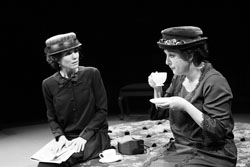You don’t simply watch Matthew Barber’s adaptation of Elizabeth von Arnim’s 1922 novel, Enchanted April (ends Thurs., Aug. 12; ACT Theatre, 206-292-7676)—you sink into it luxuriantly, like an overflowing bubble bath with a sweet, cheap scent. It’s sensuous, yet without a hint of sin, and at first blush it seems the easiest of entertainments, an escapist fantasy for ladies about an Italian villa as the antidote to all that is unsunny about English domestic life. It’s a sister under the skin to some of the most popular feminist dramas of our own time, and might be more awkwardly titled No Sex and the City, Please, We’re British and Emulating Thelma & Louise & Merchant & Ivory Under the Tuscan Sun.
In fact, the tale of four Brit women who succumb to enchantment in defiance of men’s wishes is not at all easy to pull off. The characters are caricatures rendered with a fat pen clutched in a hammy fist. The plot is as thin and foreseeable as a telephone line in North Dakota. Both the jokes and the sentiments are as sturdy as 1922 butterfly wings. If you don’t have a sure-handed director, eye-delighting costumes, and a cast as precise and inspired as anybody in the business, the fantasy would flop dead on the stage. Happily, director Warner Shook has just such advantages in his ACT production and deploys them to brilliant effect.
The lead conspirator is dotty, potty Lotty Wilton (Julie Briskman), who spots a newspaper ad for the Mediterranean villa and buttonholes prim Rose Arnott (Suzanne Bouchard), a stranger from her church, to rent it with her and leave the husbands behind. Lotty could be insufferable—she fully justifies another character’s complaint, “Honestly, Lotty, you’d make Pollyanna ill!”—but Briskman is as radiant as the southern sun. Even her most lightweight mots hit the bull’s-eye; if you try to resist her charm on high-minded grounds, you feel like a harrumphing husband.
Bouchard has a tougher time at first, though she ably brings the blush of romance back to Rose’s cheek. Rose’s Christian repression is less stage-filling than Lotty’s bonhomie, and her husband problem is less legible: Lotty’s man, Mellersh Wilton (David Pichette, deftly setting British dignity back 100 years), is a familiar send-up of tut-tut oblivious officiousness; Rose’s mate, Frederick Arnott (Michael Winters), is odder, a racy book author with a taste for champagne and an eye for the ladies. We don’t exactly get what Frederick’s deal is, nor why it is he and Rose apparently haven’t had sex in two years.
It’s more clear that Rose’s reluctance will stand no chance against Lotty’s relentless enthusiasm. They’re off to Italy to meet their roommates, rich Caroline Bramble (Deborah Fialkow), a flapper fashion plate with sharp edges inclined to cut you dead, and elderly Mrs. Graves (Suzy Hunt). Fialkow, elegant as etched glass, fills Bramble’s voice with money and glides around the villa like a shark on a fashion runway. Hunt really goes to town as the rusticating crone: When she imperiously rolls her r’s—”I only desire to sit quietly and rrrembember!” “Inheritance is so much more rrrespectable than acquisition!”—it’s like rolling thunder.
Robert A. Dahlstrom’s rainy, gloomy English set shifts satisfyingly into balmy Italiana; Mary Louise Geiger’s lighting and Frances Kenny’s costumes make Lotty and Rose shed 20 years before your eyes. Outfits with severe gray checked patterns reminiscent of cyclone fencing give way to floral extravagance.
There’s more to the spell than mere makeovers. The women’s squabbling reveals their romantic snafus, and potential new ones arise when the villa’s owner, mild-mannered gentleman Antony Wilding (R. Hamilton Wright), arrives. The Italian maid (Marianne Owen, in one of her better performances) injects mild linguistic Brit-bashing comedy. And when the husbands show up, a bracing bit of farce ensues. Winters makes the most of his Feydeau moments, and Wright does yeoman service, but the playwright’s heart isn’t really in these subplots. This play is about fidelity restored, and its naughtiest bits and biggest laughs involve Mellersh victimized by Italian plumbing.
Enchanted April may lack the transforming sorcery of true drama, but as a pleasant and funny hit show, it does the trick.








